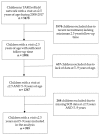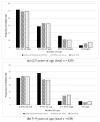The Association between Early Childhood and Later Childhood Sugar-Containing Beverage Intake: A Prospective Cohort Study
- PMID: 31581586
- PMCID: PMC6835692
- DOI: 10.3390/nu11102338
The Association between Early Childhood and Later Childhood Sugar-Containing Beverage Intake: A Prospective Cohort Study
Abstract
Sugar-containing beverages (SCBs) are a major source of sugar intake in children. Early life intake of SCBs may be a strong predictor of SCB intake later in life. The primary objective of this study was to evaluate if SCB intake (defined as 100% fruit juice, soda, and sweetened drinks) in early childhood (≤2.5 years of age) was associated with SCB intake in later childhood (5-9 years of age). A prospective cohort study was conducted using data from the TARGet Kids! primary care practice network (n = 999). Typical daily SCB intake was measured by parent-completed questionnaires. Odds ratios (OR) and 95% confidence intervals (CI) were estimated using logistic regression. A total of 43% of children consumed ≥0.5 cups/day of SCBs at ≤2.5 years and this increased to 64% by 5-9 years. Daily SCB intake, compared to no daily intake, at ≤2.5 years was significantly associated with SCB intake at 5-9 years (adjusted OR: 4.03; 95% CI: 2.92-5.55) and this association was much stronger for soda/sweetened drinks (adjusted OR: 12.83; 95% CI: 4.98, 33.0) than 100% fruit juice (OR: 3.61; 95% CI: 2.63-4.95). Other early life risk factors for SCB intake at 5-9 years were presence of older siblings, low household income, and shorter breastfeeding duration. Daily intake of SCBs in early childhood was strongly associated with greater SCB intake in later childhood. Early life may be an important period to target for population prevention strategies.
Keywords: child; fruit juices; infant; life-course epidemiology; sugars.
Conflict of interest statement
J.L.M. received an unrestricted research grant for a completed investigator-initiated study from the Dairy Farmers of Canada (2011–2012) and Ddrops provided non-financial support (vitamin D supplements) for an investigator-initiated study on vitamin D and respiratory tract infections (2011–2015). The other authors declare no conflict of interest.
Figures
References
-
- Vos M.B., Kaar J.L., Welsh J.A., Van Horn L.V., Feig D.I., Anderson C.A.M., Patel M.J., Cruz Munos J., Krebs N.F., Xanthakos S.A., et al. Added Sugars and Cardiovascular Disease Risk in Children: A Scientific Statement From the American Heart Association. Circulation. 2017;135:e1017–e1034. doi: 10.1161/CIR.0000000000000439. - DOI - PMC - PubMed
-
- Fidler Mis N., Braegger C., Bronsky J., Campoy C., Domellöf M., Embleton N.D., Hojsak I., Hulst J., Indrio F., Lapillonne A., et al. Sugar in Infants, Children and Adolescents: A Position Paper of the European Society for Paediatric Gastroenterology, Hepatology and Nutrition Committee on Nutrition. J. Pediatr. Gastroenterol. Nutr. 2017;65:681–696. doi: 10.1097/MPG.0000000000001733. - DOI - PubMed
MeSH terms
Substances
Grants and funding
LinkOut - more resources
Full Text Sources
Medical



